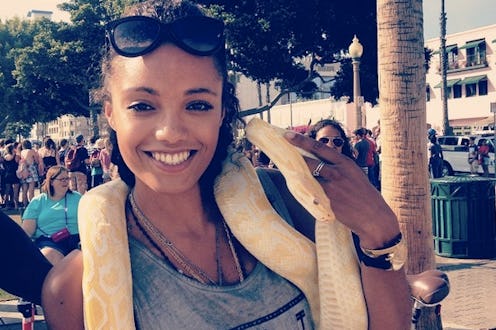Entertainment
Why 'The Originals' New Rebekah Matters

You would think that, after centuries of living together, a certain vampire family would have learned to just get along. But nope. The Mikaelsons, despite having been alive since the Middle Ages, still have some major issues to sort out. Which is why, in the mid-season finale, Kol ensured that Rebekah's soul ended up in the body of a witch who is currently trapped for all eternity inside a spooky insane asylum. Rude. But while Kol's backstabbing ways may not be good for Rebekah, they're very good for TV viewers. Because The Originals' "new" Rebekah, actress Maisie Richardson-Sellers, is a woman of color. This is the third time this franchise has recast a Mikaelson as a person of color (through some magical plot maneuvers), but the move remains astonishingly uncommon in TV and movies, in general.
It's remarkable because The Originals is far from the only series in which one character is played by a bunch of different actors from different backgrounds, with different features, hair colors, etc. Think of Doctor Who (there have been 12 Doctors on the TV show alone), or James Bond (currently on version number eight), or even Batman (too many to count). We've seen older, younger, shorter, taller, blonder, and brunette-r versions of all these fictional characters. But they've all always been played by white actors. So, though at first it might not seem like a big deal that the Rebekah we've come to know on both The Vampire Diaries and The Originals is now a black woman (along with a few of her other magical relatives), it's actually a pretty big step, even if there's a whole body-swapping loophole.
Yes, Rebekah's situation is a little different than those other characters. While Chris Nolan's Batman exists in a different universe from Tim Burton's Batman, the Rebekah now played by British actress Maisie Richardson-Sellers is the same person as she was throughout the rest of The Originals. She's lost her immortality and gained some new powers (along with a fancy accent), but her soul has remained the same. Only her physical form has changed.
In a way, that's even better than if Richardson-Sellers' Rebekah existed in an "alternative" Originals. Rebekah, for the time being, exists as a black character — which, of course, should not be the most remarkable thing about her. She's an ancient vampire who can shift between bodies, remember? The color of the body shouldn't particularly matter. But, when you've got decades and decades of other characters who can also transform into other people (either through their own powers, like The Doctor, or through the magic of Hollywood casting, like James Bond), and none of them have ever transformed into anything besides a British white guy, then yes, "new" Rebekah's race does matter.
It especially matters this week, when one of the whitest groups of Oscar nominees since 1998 was announced. The awards' lack of diversity seemed to suggest that the Hollywood powers that be see white stories as universal, dividing non-white stories from the mainstream. Until that changes, we're all missing out on a lot of good stories. Hopefully, Rebekah's new body can be a small push toward that much larger change.
Images: maisiersellers/Instagram; PixGood